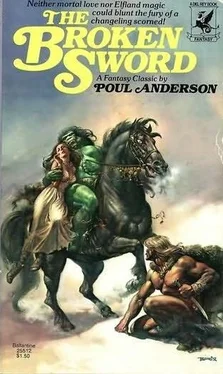Poul Anderson - The Broken Sword
Здесь есть возможность читать онлайн «Poul Anderson - The Broken Sword» весь текст электронной книги совершенно бесплатно (целиком полную версию без сокращений). В некоторых случаях можно слушать аудио, скачать через торрент в формате fb2 и присутствует краткое содержание. Жанр: Фэнтези, на английском языке. Описание произведения, (предисловие) а так же отзывы посетителей доступны на портале библиотеки ЛибКат.
- Название:The Broken Sword
- Автор:
- Жанр:
- Год:неизвестен
- ISBN:нет данных
- Рейтинг книги:3 / 5. Голосов: 1
-
Избранное:Добавить в избранное
- Отзывы:
-
Ваша оценка:
- 60
- 1
- 2
- 3
- 4
- 5
The Broken Sword: краткое содержание, описание и аннотация
Предлагаем к чтению аннотацию, описание, краткое содержание или предисловие (зависит от того, что написал сам автор книги «The Broken Sword»). Если вы не нашли необходимую информацию о книге — напишите в комментариях, мы постараемся отыскать её.
The Broken Sword — читать онлайн бесплатно полную книгу (весь текст) целиком
Ниже представлен текст книги, разбитый по страницам. Система сохранения места последней прочитанной страницы, позволяет с удобством читать онлайн бесплатно книгу «The Broken Sword», без необходимости каждый раз заново искать на чём Вы остановились. Поставьте закладку, и сможете в любой момент перейти на страницу, на которой закончили чтение.
Интервал:
Закладка:
He lapsed into his thoughts and the sisters into silence. Nor did the men say much, so that the only sounds were the whoot of wind in the rigging, the brawl of sea past the bows, the creak of straining timbers. Overhead flew grey clouds from which snow or hail often whirled, and the vessels rolled and pitched alone on the running waves.
On the third day, near nightfall, beneath a sky so low and thick as almost to bring dusk by itself, they raised Finnmark. Bleak rose the cliffs from surf that shattered itself booming upon them. Their heights were bare save for snow and ice and a few wind-twisted trees.
“That is an ugly land,” shivered Valgard’s steersman, “and I see naught of the garth whereof you spoke.”
“Make for that fjord ahead,” commanded the chief.
The wind blew them into it, until the sullen cliffs blocked it off. Then masts were lowered and oars came out, and the ships splashed through twilight towards a rock-strewn beach. Peering before him, Valgard saw the trolls.
They were not quite as tall as him, but nigh twice as broad, with arms like tree boughs that hung to their knees, bowed short legs and clawed splay feet. Their skin was green and cold and slippery, moving on their stone-hard flesh. Few of them had hair, and their great round heads, with the flat noses, huge fanged mouths, pointed ears, and eyes set far into bone-ridged sockets, were like skulls. Those eyes lacked whites, were pits of blackness.
They went for the most part unclad, or wore but a few skins, however freezing the wind. Their weapons were chiefly clubs, and axes, spears, arrows, and slings that used stone, all too heavy for men to swing. But some wore helms and byrnies and carried weapons of bronze or elven alloy.
Valgard could not but shudder at the sight. “Has the cold gotten to you?” asked a man of his.
“No-no-’tis naught,” he muttered. And to himself: “I hope the witch was right and the elf women are fairer than these. But they will make wondrous warriors.”
The vikings grounded their ships and drew them ashore. Thereafter they stood unsurely in the dusk. And Valgard saw the trolls come down on onto the strand.
The fight was short and horrible, for the men could not see their foes. Now and again a troll might happen to touch iron and be seared by it, but mostly they knew well how to dodge that metal. Their laughter coughed between the cliffs as they dashed out men’s brains, or ripped them limb from limb, or hunted them up through the mountains.
Valgard’s steersman saw his fellows die while his chief leaned unmoving on his axe. The viking roared and rushed on the berserker. “This is your doing!” he shouted.
“Indeed it is,” replied Valgard, and met him in a clamour of steel. Erelong he had slain the steersman, and by that time the rest of the battle was over.
The troll captain approached Valgard. Rocks scrunched beneath his tread. “We had word of your coming, from a bat that was also a rat,” he rumbled in the Danish tongue, “and give you many thanks for good sport. Now the king awaits you.”
“I come at once,” said Valgard.
He had already gagged the sisters and bound their arms behind them. Stunned with what they had witnessed, they stumbled blindly along a deep gorge and a barren mountainside, past unseen guards into a cave and thence into the hall of Illrede.
It was huge, hewn out of rock but furnished with magnificence raided from elves, dwarfs, goblins, and other folk, men among them. Great gems gleamed on the walls amid subtle tapestries, costly goblets and cloth bedecked tables of ebony and ivory, and the fires burning down the length of the hall lit rich garments on the troll lords and their ladies.
Thralls of elf, dwarf, or goblin race moved about with trenchers of meat and cups of drink. This was a high feast, for which human and Faerie babies had been stolen as well as cattle, horses, pigs, and wines of the south. Music of the snarling sort that the trolls liked came rattling out of the smoky air.
Along the walls stood guards, moveless as heathen idols, the ruddy light aglint on their spearheads. The trolls at table gobbled and guzzled, quarrelling with each other in a thunderous din. But the lords of Trollheim sat quiet in their carven seats.
Valgard’s gaze went to Illrede. The king was vast of girth, with a wrinkled massive face and a long beard of green tendrils. When his inkpool eyes fell on the newcomers, a fear that he sought to hide prickled over the changeling’s backbone. “Greeting, great king,” he said. “I am Valgard Berserk, come from England to seek a place in your host. I am told you are father to my mother, and fain would I claim my heritage.”
Illrede nodded his gold-crowned head. “That I know,” he said. “Welcome, Valgard, to Trollheim, your home.” His glance swung to the maidens, who had sat down for want of further strength, forlornly side by side. “But who are these?”
“A small gift,” said Valgard firmly, “children of my foster father. I hope they will please you.”
“Ho-ho, ho-ho, ho, ho!” Illrede’s laughter shocked through the stillness that had fallen. “A goodly gift! Long is it since I held a human may in my arms-Aye, welcome, welcome, Valgard!”
He sprang to the floor, which thudded under his weight, and went over to stand above the girls. Freda and Asgerd looked wildly about them. One could well-nigh read their thoughts: “Where are we? A lightless cave, and Valgard talks to no one, but the echoes are not of his words—”
“You should see your new home,” leered Illrede, and touched their eyes. And at once they had the witch-sight, and saw him stooping over them, and their courage broke and even through the gags their screams went on and on.
Illrede laughed again.
X
The elf raid on Trollheim was to be a strong one. Fifty longships were manned with the best warriors of Britain’s elves, and veiled and warded by the sorceries of Imric and his wisest warlocks. It was thought that under these spells they could sail unseen into the very fjords of Finnmark’s troll realm; how deeply inland they could thrust thereafter would hang on what resistance they met. Skafloc hoped they could get into Illrede’s own halls and bring back the king’s head. He was wild to go.
“Be not too reckless,” cautioned Imric. “Kill and burn, but lose no men in mere adventures. ’Twill be worth more if you get a measure of their strength than if you wipe out a thousand of them.”
“We will do both,” grinned Skafloc. He stood restless as a young stallion, eyes alight, the tawny hair tumbling down from his headband.
“I know not-I know not.” Imric looked grave. “I feel, somehow, that no good will come of this trip, and would fain order it halted.”
“If you do that, we will go anyway,” said Skafloc.
“Aye, so you will. And I may be wrong. Go, then, and luck be with you.”
On a night just after sunset, the warriors embarked. A moon newly risen cast silver and shadow on the crags and scaurs of the elf-hills, on the strand from which they rose, on the clouds racing eastward on a wind that filled heaven with its clamour. The moonlight ran in shards and ripples over the waves, which tumbled and roared, white-maned, on the rocks. It shimmered off weapons and armour of the elf warriors, while the black—and-white longships drawn up on the shore seemed but shades and light-gleams.
Skafloc stood wrapped in a cape, the wind streaming his hair, awaiting the last of his men. To him, pale in the moonlight, with her tresses tossing cloudy and her eyes aglow, came Leea.
“ ’Tis good to see you,” cried Skafloc. “Bid me farewell and sing a song for my luck.”
“I cannot give you goodspeed properly, for I cannot come up to that iron byrnie of yours,” she answered in her voice that was like breeze and rippling water and small bells heard from afar. “And I have a feeling my spells will avail naught against a doom that is set for you.” Her gaze sought his. “I know, with a sureness beyond proof, that you sail into a trap; and I beg you, by the milk I gave you as a child and the kisses as a man, to stay home this one time.”
Читать дальшеИнтервал:
Закладка:
Похожие книги на «The Broken Sword»
Представляем Вашему вниманию похожие книги на «The Broken Sword» списком для выбора. Мы отобрали схожую по названию и смыслу литературу в надежде предоставить читателям больше вариантов отыскать новые, интересные, ещё непрочитанные произведения.
Обсуждение, отзывы о книге «The Broken Sword» и просто собственные мнения читателей. Оставьте ваши комментарии, напишите, что Вы думаете о произведении, его смысле или главных героях. Укажите что конкретно понравилось, а что нет, и почему Вы так считаете.











